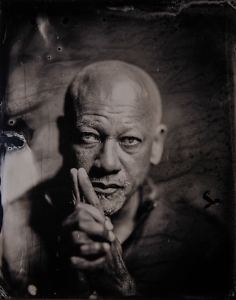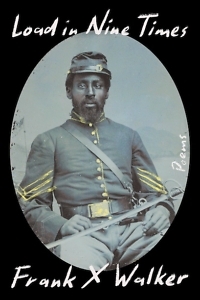America’s Promise
Frank X Walker’s Load in Nine Times gives voice to enslaved and enslaver in Civil War-era Kentucky
Load in Nine Times is Frank X. Walker’s poetic exploration of American life in the period surrounding the Civil War. In his 12th volume of poetry, Walker marches us through the groundswell of the antebellum period, the war, and the sorrows of Reconstruction. The collection takes Kentucky as its geographical framework, speaking through enslaved mothers, fathers, and children and masters and mistresses.

In Load in Nine Times, everyone is a soldier, sometimes fighting on a battleground of the internal kind. Walker is a poet of the teaching kind and is director of the Master of Fine Arts program at the University of Kentucky. His work has been awarded the NAACP Image Award for Outstanding Poetry Collection (2014), Appalachian Heritage Award (2013), Lannan Literary Fellowship in Poetry (2005), and many other prestigious honors. A native of Kentucky, he served as the state’s poet laureate from 2013 to 2015.
Many of Walker’s poems are written in dialect. While poems do not require historical accuracy to function, Walker achieves an authenticity by voicing both master and slave with regional color. For instance, in “Accounting” he writes, “He counted 48 a us / from 6 full moons to 60 winters, / including 4 fugitives / from the state a Virginny.” Here, we can interpret the speaker as an enslaved person, and they deliver their lines in the rhythm of the cotton fields.
Walker also uses this poem to touch on a less commonly acknowledged phenomenon: women slaveowners. In the last line of the poem, the speaker bemoans, “The bad news: / Alla us be property / a Matilda Burks.” The enslaved speaker is not relieved by this knowledge, as some might suggest that to be owned by a woman in the antebellum South was to be guaranteed less harsh treatment. The speaker makes clear that slavery is slavery and their sorrows will continue. In highlighting this, Walker connects to books like Stephanie Jones-Rogers’ They Were Her Property, which examines the lives of enslaved people and slaveholding women.
 Later, Walker returns to dialect with the poem “Damned Northern Aggressors,” in which he writes, “They want to take coins right out of my pocket, / turn my wealth into ghosts, / leave my corn rottin’ in the field / expect me to slop my own hogs, / send me crawlin’ to the po’ house.” Here, the enslaved humans are the “coins” that will be taken from the slaveholding speaker’s pocket by Northern abolitionists. But the bitterness is not mere capitalist resentment. In Walker’s lyrical effort at walking us around the sphere of life in the Civil War South, he is not preaching an “all sides matter” gospel. In the closing lines of this same poem, the speaker makes his hatred clear: “I swung the cowhide for every northern sumbitch / I ever met. I swung it again for every [n*****] soldier / that signed up to kill whites.” It is important to note that these dialect poems are carefully placed throughout the collection. We are carried through the full course of sight and sound in the world of Load in Nine Times with shape poems and others of varied length and language play.
Later, Walker returns to dialect with the poem “Damned Northern Aggressors,” in which he writes, “They want to take coins right out of my pocket, / turn my wealth into ghosts, / leave my corn rottin’ in the field / expect me to slop my own hogs, / send me crawlin’ to the po’ house.” Here, the enslaved humans are the “coins” that will be taken from the slaveholding speaker’s pocket by Northern abolitionists. But the bitterness is not mere capitalist resentment. In Walker’s lyrical effort at walking us around the sphere of life in the Civil War South, he is not preaching an “all sides matter” gospel. In the closing lines of this same poem, the speaker makes his hatred clear: “I swung the cowhide for every northern sumbitch / I ever met. I swung it again for every [n*****] soldier / that signed up to kill whites.” It is important to note that these dialect poems are carefully placed throughout the collection. We are carried through the full course of sight and sound in the world of Load in Nine Times with shape poems and others of varied length and language play.
Poets sometimes write poems to speak to each other and in doing so often take on the voice of the poet they are addressing. This is usually indicated by an acknowledgment below the title of the poem. For example, the first poem in this collection, “Truth Be Told,” is “after Natasha Trethewey.” Walker redefines this tradition by addressing and taking on the voice of enslaved people and African American soldiers. In “Testify,” he writes as and to Margaret Garner, the Kentucky woman who killed her daughter rather than return to slavery and whose story inspired Toni Morrison’s novel Beloved. Margaret says: “Look at me and my swollen belly. / Look at my pale pale skin.” Walker writes “Mother May I?” in the spirit of Randall Edelen who, according to the Kentucky U.S. Colored Troops Project, enlisted in the Union Army without the consent of his owner: “I’m sure Miss Jane felt like / she been robbed / losing nine slaves all at one / with the power of my X.”
This journey into hidden African American history should not come as a surprise from Walker, who coined the termed “Affrilachia” to express the presence and contributions of Black folks in Appalachia. Amid the rising tide of ahistorical redefinitions and book bans, Load in Nine Times is a collection for this very cultural hour. It is, in short, for everyone. But it is especially for those who say in their souls, “I am America’s promise, my mother’s song, / and the reason my father had every right to dream.”

Kashif Andrew Graham is a writer and theological librarian who received the 2023 Humanities Tennessee Fellowship in Criticism. He enjoys writing poetry on his collection of vintage typewriters and is at work on a novel about an interracial gay couple living in East Tennessee.


